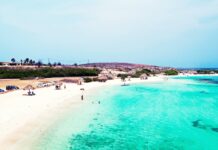La familia Forestier contribuyó al desarrollo socioeconómico de los municipios occidentales de Mayagüez, Las Marías y Maricao.
El libro póstumo de la historiadora Keyla Forestier Montalvo, Las raíces del árbol que me hicieron puertorriqueña: Los Forestier, De Francisco a Conrado… mucho más que una biografía, es un testimonio de la aportación de una familia afropuertorriqueña a la sociedad de su tiempo y al presente.
(En ambos idiomas)
(San Juan, P.R.) La investigación genealógica transforma los conceptos que hemos establecido sobre nuestros orígenes familiares. Esta, junto al estudio del genoma humano, nos llevan a reescribir la historia. Estas técnicas también nos motivan a investigar la vida y obra de los ancestros.
El libro póstumo de la historiadora Keyla Forestier Montalvo, Las raíces del árbol que me hicieron puertorriqueña: Los Forestier, De Francisco a Conrado… mucho más que una biografía, es un testimonio de la aportación de una familia afropuertorriqueña a la sociedad de su tiempo y al presente. La familia Forestier contribuyó al desarrollo socioeconómico de los municipios occidentales de Mayagüez, Las Marías y Maricao.
La historiadora no pudo ver su obra publicada debido a su temprana partida a la eternidad el 13 de octubre de 2019. Trabajó en el libro hasta el final de sus días enviándole grabaciones a su prima Evelyn Magaly Forestier-Pelletier, quien las transcribía. Magaly, residente de North Bergen, Nueva Jersey, le envió a Keyla el documento impreso a principios de octubre 2019, pero la semana en que lo recibió, su enfermedad se agravó y no pudo revisarlo. Dos semanas después, se despedía de su vida terrenal.
Magaly no deseaba que los años de investigación de Keyla, así como su testimonio de amor a la familia, no se publicara. Conversó con su amiga de juventud, la genial historiadora ponceña, Dra. Neisa Rodríguez Deynes, para que la orientara en el proceso de publicación del libro.
La publicación salió a la luz en el año 2020 como una producción de Forestier-Pelletier con la asesoría de Professional Editions, la casa editorial de la Dra. Rodríguez Deynes. La obra tiene 230 páginas divididas en cuatro capítulos, una conclusión, notas y una bibliografía. La investigación cuenta con fotos de alta calidad, fotocopias de documentos y el árbol genealógico de la familia Forestier.
Keyla llevó a cabo una investigación minuciosa que le permitió destapar secretos familiares y reencontrarse con sus ancestros afrocaribeños. La obra es amena, fácil de leer y está enriquecida con información sobre el origen de los apellidos. En el caso del apellido Forestier este significa guardabosques (Forest es bosque en francés). Debo decir, que la riqueza de las palabras y de las imágenes forjadas por la autora para llevarnos a través de una lectura apasionada se prestan para sacar una novela o un guion cinematográfico.
El texto es un homenaje testimonial a la contribución socioeconómica de una familia afrodescendiente a la región oeste de Puerto Rico. Reconoce, además, la mezcla de grupos étnicos que se dio en el occidente isleño y el poder económico de algunas familias negras a pesar del racismo. Las raíces francesas, haitianas, españolas y sanmartinianas de la familia Forestier evidencian la intensa migración que llegó a las playas isleñas desde finales del siglo XVIII.
Al respecto, la prima de Keyla, la artista y poeta Deborah Magdalena Torres Forestier, hermana del flautista Néstor Torres Forestier, nos dice que, “los puertorriqueños están redescubriendo sus raíces afrocaribeñas y su conexión con el resto de las islas. El legado de los Forestier Chaluisant vive en mi corazón y en mis sueños”.
El fundador de la familia, Francisco Forestier llegó a Mayagüez desde Francia, a principios del siglo XIX como jornalero, obtuvo su carta de residencia en 1820 y se naturalizó en 1831. Tuvo nueve hijos con Constanze Doublet, natural de Jacomet, Haití. No existe constancia que Francisco y Constanze hubieran contraído nupcias y no todos los hijos fueron reconocidos inmediatamente. Solo cinco hijos aparecen con el apellido Forestier, dos hembras llevan el apellido materno y dos más no fueron reconocidos hasta 1849. El mayor de los hijos nació en 1826, José Eduardo. El bisabuelo de Keyla, Teodoro, nació en 1839 y falleció en 1911.
Don Teodoro Forestier Doublet fue agricultor, comerciante, hacendado y político. Reconocido líder liberal también participó activamente en la masonería siendo cofundador de la Logia Washington. En el monumento a don José de Diego en la ciudad de Mayagüez aparece listado don Teodoro como uno de los benefactores de la Sultana del Oeste. Con doña Nora Harris de la isla de San Martín tuvo dos hijos, entre ellos don Eugenio Forestier Harris, bisabuelo de Keyla.
Forestier Harris fue un poderoso hacendado con propiedades en Mayagüez, Las Marías, Maricao y Hormigueros. Al igual que su padre incursionó en la política. Fue vicepresidente del Consejo Municipal de Mayagüez durante su tenencia entre 1903 y 1907. Entre sus muchos hijos, tuvo a don Conrado Forestier Moyé con doña Magdalena Moyé Madera.
Don Conrado, el abuelo de Keyla, fue un reconocido empresario, dueño de la Cantera la Providencia en el barrio Limón de Mayagüez. Contrajo nupcias con doña Providencia Chaluisant, maestra de escuela. El matrimonio tuvo cinco hijos, Clara Luisa, Irma Estrella, Providencia, Conrado y David. La familia Forestier fue miembro de la Iglesia Presbiteriana. Estuvieron muy activos en el escutismo y en el cooperativismo. Entre los muchos logros comunitarios de la familia debemos destacar que las hermanas Forestier Chaluisant contribuyeron a la declaración de la Escuela Theodore Roosevelt como “modelo” en 1967.
“Las raíces del árbol que me hicieron puertorriqueña: Los Forestier… es un hermoso recuento de la historia de seis generaciones de la familia Forestier, los antepasados de la autora. Pero no es solo una historia familiar. Es parte integral y sustancial de la historia etnográfica de Puerto Rico, enmarcada principalmente en el área oeste, en la ciudad de Mayagüez y los pueblos de Las Marías y Maricao”, indica la Dra. Rodríguez Deynes, catedrática de Historia de la Pontificia Universidad Católica de Puerto Rico.
“Keyla Forestier Montalvo integra magistralmente la dinámica de la interconectividad entre Europa. América y Las Antillas en los siglos XVIII, XIX y XX, intercalando eventos como la Revolución Francesa, la Revolución Esclava de Haití, las Revoluciones de Independencia de América Latina, la cercanía de Santo Domingo y las islas del Caribe, e incluso las peripecias de la expansión territorial continental de Estados Unidos, para contextualizar los eslabones que han dado forma al pueblo y la cultura puertorriqueña”, añadió Rodríguez Deynes en sus comentarios sobre la obra.
Keyla Forestier Montalvo, 1963-2019, estudió su bachillerato (licenciatura) en historia en la Pontificia Universidad Católica en Ponce y su maestría en el Centro de Estudios Avanzados de Puerto Rico y el Caribe. Su tesis, Ponce a la vanguardia de los servicios de salud, fue dirigida por los doctores Luis M. Díaz Soler y Ricardo Alegría.
Si la pandemia lo permite, Las raíces del árbol que me hicieron puertorriqueña: Los Forestier, De Francisco a Conrado… mucho más que una biografía, se presentará en Mayagüez este próximo octubre.
La obra debe ser leída y ser objeto motivador para que todos investiguemos los orígenes de nuestras familias. Gracias Keyla por este grandioso regalo histórico-biográfico, romper con estereotipos y demostrarnos a través de tus ancestros que los sueños no tienen límites. Magaly, un fuerte y sonoro aplauso por perpetuar la obra de tu prima en beneficio de todos los que amamos este terruño borincano.
The Forestiers, the saga of a Puerto Rican family
(San Juan, P.R.) Genealogical research transforms the concepts we have established about our family origins. This, together with the study of the human genome, leads us to rewrite history. These techniques also motivate us to investigate the life and work of the ancestors.
The posthumous book by historian Keyla Forestier Montalvo, Las raíces del árbol que me hicieron puertorriqueña: Los Forestier, De Francisco a Conrado… mucho más que una biografía (The Roots Of TheTtree that Made Me Puerto Rican: The Forestiers, From Francisco to Conrado … Much More Than A Biography), it is a testimony of the contribution of an Afro-Puerto Rican family to the society of its time and at to the present. The Forestier family contributed to the socioeconomic development of the western municipalities of Mayagüez, Las Marías and Maricao.
The historian was unable to see her published work due to her early departure to eternity on October 13, 2019. She worked on the book until the end of her days sending recordings to her cousin Evelyn Magaly Forestier-Pelletier, who transcribed them. Magaly, a resident of North Bergen, NJ, sent Keyla the printed document in early October 2019, but the week she received it, her illness worsened and she was unable to review it. Two weeks later, she said goodbye to her earthly life.
Magaly did not want Keyla’s years of research, as well as her testimony of love for the family, not to be published. She spoke with her friend from youth, the brilliant historian from Ponce, Dra. Neisa Rodríguez Deynes, to guide her in the process of publishing the book.
The book was published in 2020 as a Forestier-Pelletier production with the advice of Professional Editions, the publishing house of Dr. Rodríguez Deynes. The work has 230 pages divided into four chapters, a conclusion, notes and a bibliography. The investigation includes high-quality photos, photocopies of documents and the genealogical tree of the Forestier family.
Keyla carried out a thorough investigation that allowed her to uncover family secrets and reconnect with her Afro-Caribbean ancestors. The work is entertaining, easy to read and is enriched with information on the origin of surnames. In the case of the surname Forestier this means ranger (Forest is forest in French). I must say that the richness of the words and images forged by the author to take us through a passionate reading lend themselves to getting a novel or a film script.
The text is a testimonial tribute to the socioeconomic contribution of an Afro-descendant family to the western region of Puerto Rico. It also recognizes the mixture of ethnic groups that occurred in the western island and the economic power of some black families despite racism. The French, Haitian, Spanish and San Martinian roots of the Forestier family show the intense migration that reached the island’s beaches since the end of the 18th century.
In this regard, Keyla’s cousin, artist and poet Deborah Magdalena Torres Forestier, sister of flutist Néstor Torres Forestier, tells us that, “Puerto Ricans are rediscovering their Afro-Caribbean roots and their connection with the rest of the islands. The legacy of the Forestier Chaluisant lives in my heart and in my dreams”.
The founder of the family, Francisco Forestier came to Mayagüez from France at the beginning of the 19th century as a laborer, obtained his residence permit in 1820 and naturalized in 1831. He had nine children with Constanze Doublet, a native of Jacomet, Haiti. There is no record that Francisco and Constanze were married, and not all the children were give their father’s surname immediately. Only five children appear with the Forestier surname, two females bear the maternal surname and two more were not given the paternal surname until 1849. The eldest of the Forestier children was born in 1826, José Eduardo. Keyla’s great-grandfather, Teodoro, was born in 1839 and passed away in 1911.
Don Teodoro Forestier Doublet was a farmer, merchant, landowner, and politician. Recognized liberal leader also actively participated in Freemasonry as a co-founder of the Washington Lodge. In the monument to Don José de Diego in the city of Mayagüez, Don Teodoro appears as one of the benefactors of the Sultaness of the West He had two children with Mrs. Nora Harris from the island of San Martín, including Mr. Eugenio Forestier Harris, Keyla’s great-grandfather.
Forestier Harris was a powerful landowner with properties in Mayagüez, Las Marías, Maricao and Hormigueros. Like his father, he ventured into politics. He was vice president of the Municipal Council of Mayagüez during his tenure between 1903 and 1907. Among his many children, he had Conrado Forestier Moyé with Mrs. Magdalena Moyé Madera.
Conrado, Keyla’s grandfather, was a renowned businessperson, owner of the Providencia Stone Quarry in the Limón neighborhood of Mayagüez. He married Providencia Chaluisant, a schoolteacher. The couple had five children, Clara Luisa, Irma Estrella, Providencia, Conrado and David. The Forestier family was a member of the Presbyterian Church. They were very active in scouting and cooperativism movements. Among the many community accomplishments of the family, it should be noted that the Forestier Chaluisant sisters contributed to the declaration of Theodore Roosevelt School as a “model” in 1967.
“The roots of the tree that made me Puerto Rican: The Forestiers… is a beautiful account of the history of six generations of the Forestier family, the ancestors of the author. But it is not just a family story. It is an integral and substantial part of the ethnographic history of Puerto Rico, framed mainly in the western area, in the city of Mayagüez and the towns of Las Marías and Maricao ”, indicates Dr. Rodríguez Deynes, professor of History at the Pontificia Universidad Católica from Puerto Rico.
“Keyla Forestier Montalvo masterfully integrates the dynamics of interconnectivity between Europe. America and the Antilles in the 18th, 19th and 20th centuries, interspersing events such as the French Revolution, the Slave Revolution in Haiti, the Revolutions of Independence in Latin America, the proximity of Santo Domingo and the Caribbean islands, and even the vicissitudes of the continental territorial expansion of the United States, to contextualize the links that have shaped the Puerto Rican people and culture, ”added Rodríguez Deynes in her comments on the work.
Keyla Forestier Montalvo, 1963-2019, studied her bachelor’s degree in history at the Pontificia Universidad Católica in Ponce and her master’s degree at the Center for Advanced Studies of Puerto Rico and the Caribbean. Her thesis, Ponce at the forefront of health services, was directed by doctors Luis M. Díaz Soler and Ricardo Alegría.
If the pandemic allows it, The roots of the tree that made me Puerto Rican: The Forestiers, From Francisco to Conrado … much more than a biography, will be presented in Mayagüez this coming October.
The work must be read and be a motivating object for all of us to investigate the origins of our families. Thank you Keyla for this great historical-biographical gift, breaking stereotypes and showing us through your ancestors that dreams have no limits. Magaly, a loud and resounding applause for perpetuating your cousin’s work for the benefit of all of us who love this Puerto Rican land.




